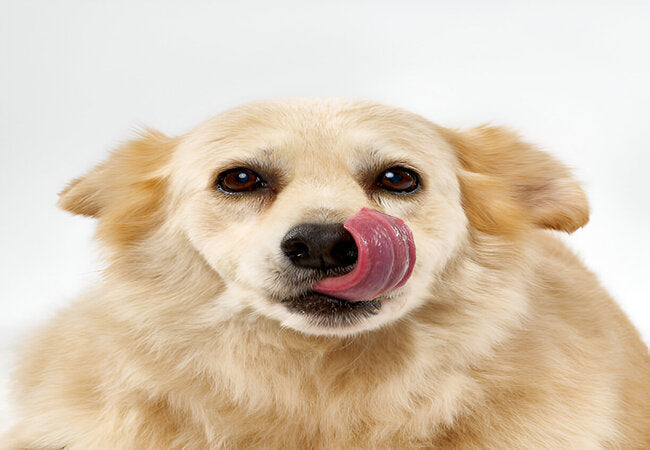2025 Vet Guide: Why Does My Dog Keep Licking His Lips? 🐶👅

In this article
2025 Vet Guide: Why Does My Dog Keep Licking His Lips? 🐶👅
By Dr. Duncan Houston BVSc
Hello! I’m Dr Duncan Houston BVSc, veterinarian and founder of Ask A Vet. Lip licking is more than just a quirky habit—it can be a subtle signal of stress, submission, nausea, dental pain, or allergies. In this comprehensive 2025 guide, you'll uncover the causes, signs to watch for, and effective responses to support your dog's wellbeing. Let’s decode that lip-licking language together! 😊
1. Normal vs. Concerning Lip Licking
Occasional lip licking is normal—for example:
- After meals or tasty treats 🍖
- When excited or anticipating food
But frequent licking, especially without food, could signify:
- 🧠 Stress or anxiety
- 🛑 Submission or calming
- 🤢 Nausea or gastrointestinal upset
- 🦷 Dental pain or oral issues
- 😖 Allergies or irritations
Context is everything—observe settings, body language, and accompanying symptoms.
2. Signals of Stress or Anxiety
Lip licking often acts as a calming or appeasement signal—a way your dog is communicating “I mean no harm.” You'll also spot:
- Ears pulled back, yawning, body turning away.
- Shaking, pacing, and excessive drooling also indicate heightened stress.
These calming signals aim to reduce tension in uncomfortable situations.
3. Submission and Peaceful Intent
Lip licking with lowered posture or averting eyes can be a dog’s respectful gesture toward another dog or human—"I'm submissive, please don’t harm me."
4. Nausea or GI Discomfort
If lip licking precedes vomiting, drooling, or abdominal upset, even subtly, nausea or gastrointestinal distress could be the cause.
Young or sensitive dogs may nibble at nothing then vomit—common in travel or car rides.
5. Dental Disease & Oral Pain
Oral pain is common: tartar, gum infections, chipped teeth, or abscesses can all prompt lip licking.
Other signs include bad breath, drooling, chewing avoidance, facial swelling or pawing at the mouth.
6. Allergies & Itchy Discomfort
Allergies—environmental or food-related—may cause lip licking, red lips, facial rubbing, and general itchiness.
Removing triggers or starting vet-recommended treatments can help resolve this behavior.
7. Other Triggers: Stressful Training Sessions
Puppies learning new commands may lick their lips when they’re not confident—it's a sign they’re feeling stressed or unsure.
Short breaks, positive reinforcement, and gentle pacing reduce confusion and anxiety.
8. When to See the Vet 🩺
Visit vet if lip licking comes with:
- Repeated vomiting, diarrhea
- Pain around mouth, bad breath, swelling
- Behavioral signs of anxiety, compulsive licking
- Suspected ingestion of toxins or foreign objects
Prompt veterinary care is vital for GI, dental, or allergy assessments.
9. Helping Your Dog: Practical Strategies ✅
Reduce Stress & Anxiety
- Calming Training: short rewards-based sessions; stop if lip licking starts.
- Safe Space: crate with comforting blanket, pheromones via Purrz.
- Desensitization: gently expose to triggers while reinforcing calm behavior.
Support Oral & GI Health
- Regular dental care: brushing, professional cleanings, dental chews.
- Vet exams for mouth issues or foreign bodies.
- Bland diet, probiotics, or fiber for nausea or upset stomach.
Allergy Management
- Identify and remove allergens from environment or diet.
- Supplement with fatty acids, antihistamines under vet guidance.
- Track licking frequency and flare-ups.
Redirect & Enrich
- Offer chew toys, dental-specific toys from Woopf.
- Keep treats and water accessible to reduce licking driven by dryness or hunger.
- Engage with walks and enrichment games to ease stress and boredom.
10. FAQs ❓
- Q: My dog licks lips only when I call them—what does it mean?
- A: This may signal mild stress or anxiety—possibly they feel unsure what you want. Use a calm tone, pause training, and reward simple correct responses.
- Q: Should I stop them from licking?
- A: Don’t punish—they’re communicating. Instead, work out the cause and gently redirect them with treats or attention.
- Q: Is chronic lip licking a habit or OCD?
- It can become compulsive (e.g. lick granulomas), especially with anxiety or boredom—seek vet behaviorist support.
11. Ask A Vet Tools & Resources
Download the Ask A Vet app for:
- 24/7 vet chat to pinpoint behavior causes
- Guidance on dental health, allergy paths, calming routines
- Recommends chew toys (Woopf), calming aids (Purrz), and behavior trackers
🩺 Final Vet Wisdom
Lip licking speaks volumes in dog body language. By tuning into context, recognizing stress signals, and addressing underlying pains—be it dental, GI, allergy, or anxiety—you can support your dog’s comfort, trust, and health. With Ask A Vet backing you, you’re never alone in your pup’s care journey. 👅🐾






